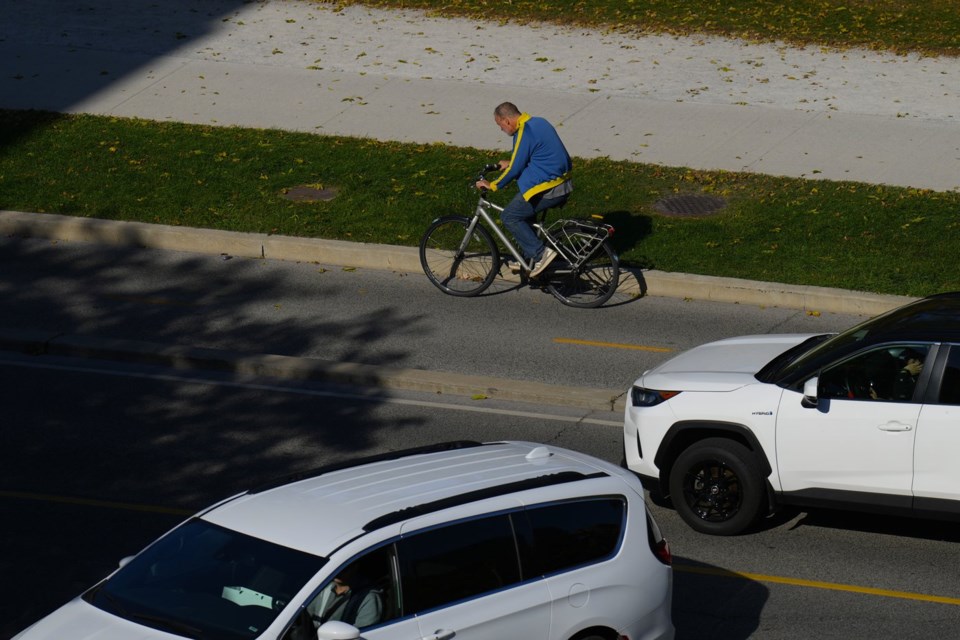TORONTO — Ontario tabled its first bill of the fall legislative sitting on Monday, in a bid to give the province veto power over some bike lanes, accelerate highway construction projects and ease environmental assessments for new highways.
The province is also trying to give itself power through regulation to remove existing bike lanes, although it's not clear how that process will work.
Ontario Premier Doug Ford promised last week to clear some bike lanes, and the government appears to have several Toronto examples in mind.
"Not everybody can use a bike to get around," said Transportation Minister Prabmeet Sarkaria.
"These are some of our major arterial roads, whether it be Bloor or University or Yonge Street. People need to get to and from work. We need to make this city a better place, an easier place to get around."
The bill would require municipalities to ask the province for permission to install bike lanes when they would remove a lane of vehicle traffic.
Last week, the Association of Municipalities of Ontario slammed the province for the proposed change, calling it a "significant overreach" of power.
The association questioned how the Ministry of Transportation would be better able to make decisions about local transportation matters than cities themselves.
It complained that none of the 444 municipalities in Ontario were consulted about the move.
Sarkaria was unapologetic about his government's decision, saying municipalities can submit their concerns about the bill as it wends its way towards becoming law.
"This is something we need to take under control," he said. "We need to move people faster."
Ford has previously complained about bike lanes on Bloor Street West creating gridlock on a road that is about a 10-minute drive from his home in Toronto's west end.
The province is focusing on the wrong issues, said New Democrat Leader Marit Stiles.
"He wants to keep meddling in everybody's business," she said of Ford.
"He needs to focus on the priorities of Ontarians, which are the basics that a provincial government should be responsible for: building the homes that people can afford, fixing schools, hiring doctors, making life more affordable."
In its overall bid to ease gridlock, the bill also seeks to facilitate construction 24 hours a day and accelerate property acquisitions.
It is also exempting the planned Highway 413 project from the provincial Environmental Assessment Act.
Instead, the bill would create a new, sped-up version of the assessment process under a new Highway 413 Act. The same process would be applied to extensions of Highways 410 and 427, which are expected to meet up with the new expressway north of Toronto.
"We're very committed to getting this done and won't let anything stand in the way of that," Sarkaria said.
He said the province, under different governments, has studied Highway 413 for the past two decades.
"We continue to have some of the most rigorous environmental standards put forward on this project," Sarkaria said. "They are still moving forward."
Sarkaria wouldn't say how much Highway 413 will cost taxpayers.
Killing the environmental assessment for the project is "completely irresponsible and reckless," said Green Party Leader Mike Schreiner.
"We saw the flooding that happened in the (Greater Toronto Area) this summer, costing over a billion dollars in insurable damages," he said.
"Shortchanging the environmental assessment, building Highway 413, paving over the headwaters and major rivers coming into the City of Toronto will only make flooding in the GTA worse."
The legislation undermines transit and cycling infrastructure that is proven to reduce congestion and lower emissions, advocacy group Environmental Defence said.
"More highways mean more gridlock, more wasted time, more destroyed natural areas and more pollution," said Tim Gray, the group's executive director.
The province is also ignoring the fate of dozens of federally protected endangered species and risks damaging the Humber, Credit and Holland Rivers, he said.
Politicians returned to Queen's Park on Monday after a 19-week summer break.
Opposition party leaders went into the fall sitting saying some of Premier Doug Ford's recent remarks and announcements, such as the idea to dig a tunnel for traffic and transit under Highway 401, are evidence he is focused more on electioneering than governing.
Ford has not ruled out calling an election in 2025, before the next fixed election date in June 2026.
This report by The Canadian Press was first published Oct. 21, 2024.
Liam Casey, The Canadian Press



